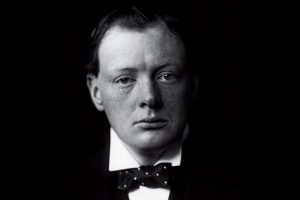
Churchill Archive
Featured Document: Letter from Princess Elizabeth to WSC

Winston Churchill, Parliament Square, London © Sue Lowry & Magellan PR
June 5, 2018
Letter from Princess Elizabeth (later Queen Elizabeth II) to WSC to thank him for the birthday gift of his “Life of Marlborough”, commenting that she had spent a very busy [18th] birthday “amongst relatives and a great many Grenadiers, which made it a very happy day…”
Find the original document here.
On 24th April 1944, Princess Elizabeth wrote a warm letter of thanks to Winston Churchill, who had given her his Marlborough: His Life and Times as a birthday present. Churchill had known Elizabeth from an early age – at two years of age, he described her as “a character [with] an air of authority and reflectiveness astonishing in an infant” – and they remained close from Churchill’s return to Downing Street in 1951 to his death in 1965. When Elizabeth became Queen in 1952, the 77-year-old statesman was her first prime minister – and, reputedly, her favourite. They enjoyed their weekly meetings, laughed a lot, and bonded over their shared interest in horses and racing. Indeed, the meetings grew from 30 minutes to two hours. Churchill had great respect for the monarchy, and he was very fond of Elizabeth. When he had a stroke soon after her coronation, Elizabeth invited the Churchills to join her to watch the St Leger and go by royal train to Balmoral, where Churchill enjoyed himself enormously and progressively recovered. When he died, Elizabeth broke royal protocol to arrive before the coffin and before the Churchill family and leave after both of them as a touching sign of respect.

2025 International Churchill Conference
As a historian, Churchill had spent nearly ten years writing the biography of his greatest ancestor, John Churchill, first Duke of Marlborough, and the four volumes published between 1933 and 1938. Churchill dwells on a remarkable range of sources – uncovering, for example, that many unfavourable opinions on Marlborough came from the memoirs attributed to King James (but written by his son, the Pretender) – to show how Marlborough protected the liberties of Europe and the Protestant faith against the designs of Louis XIV and laid the foundations of England’s future greatness.
In presenting Elizabeth with this important history lesson, Churchill’s intention was twofold. From restoring his ancestor to his honourable place in the history of England, thus providing an important corrective to Whig historiography, to warning the Queen-to-be that Marlborough’s fight against the domination of Europe by Louis XIV – resembling Churchill’s own fight against Hitler – can teach us much about how to overcome the fascist advance. Only two months after Elizabeth’s 18th birthday, D-Day would lay the foundations of the Allied victory on the Western Front.
Subscribe
WANT MORE?
Get the Churchill Bulletin delivered to your inbox once a month.




